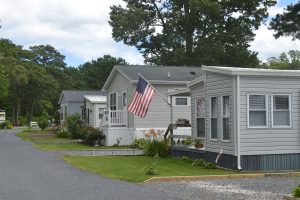
BERLIN – The lawsuit regarding occupancy at White Horse Park will not go to trial next week as an agreement between the parties has been reached.
More than a year after the lawsuit was filed, the residents fighting the county’s occupancy restrictions at White Horse Park have reached an agreement with the county and the homeowners association that will allow them to stay in their homes until the fall of 2022.
“The county and the homeowners association have agreed to give the full-time residents additional time and not to fine them for past violations,” said Hugh Cropper, the attorney representing the full-time residents. “We’re very happy we could reach an agreement that was amicable. I think this will foster a good relationship between the 30 full-time residents and the homeowners association as they move forward.”
The association’s board of directors also released a statement praising the settlement.
“Settlement of the case was strongly recommended by the park’s attorney, who stated that the Community Association achieved through the settlement most of what it could have obtained through a contested trial,” the statement reads. “More importantly, the attorney noted that, by settling, the association would save approximately $10,000 in litigation fees and costs.”
Cropper’s clients filed a lawsuit against Worcester County in 2019 as a result of its plan to begin enforcing previously ignored occupancy restrictions at White Horse Park. According to the park’s zoning restrictions, between Sept. 30 and April 1 units can’t be occupied for more than 30 consecutive days or an aggregate of 60 days. A group of residents who lived in the park, many of them for years, began working with Cropper to find a solution that would allow them to stay in their homes in spite of the language in the park’s declaration of restrictions.
When text amendments failed, they filed a lawsuit, contending that the county had given up its right to fine residents, since park officials had known of the small contingent of year-round residents for years. The White Horse Park Community Association joined the lawsuit to ensure the community remained the seasonal facility it was created as in the 1980s.
Though the case was scheduled to go to trial May 18 and 19, attorneys confirmed this week an agreement had been reached. A May 11 consent order states that the county commissioners and the community association agree not to enforce prior to April 1, 2022, the occupancy provisions. The full-time residents, in turn, admit they have violated the occupancy provisions.
“To settle the case, the county commissioners agreed not to enforce the occupancy limitations prior to April 1, 2022, provided the owners currently occupying their lots as a principal place of residence sign an affidavit admitting that they have been violating the Code and Declaration provisions that prohibit full-time occupancy in the park,” the statement from the homeowners association reads. “Since the Community Association has consistently supported the commissioners’ efforts to stop full-time occupancy of lots, the board of directors agreed to settle on the same terms as the county.”
While the consent order gives the residents until April 1 to find other accommodations, because the occupancy restrictions only apply to the off-season residents would have until the fall to leave.

